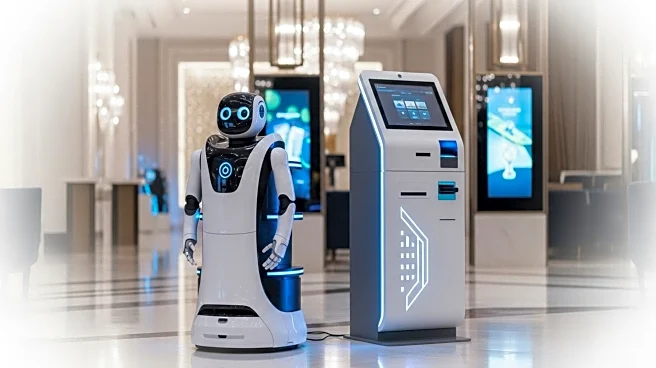What's Happening?
The hospitality industry is undergoing a significant transformation with the integration of artificial intelligence (AI) into hotel operations. AI is now capable of managing tasks that were traditionally handled by human staff, such as processing reservations, adjusting bookings, and handling payments. This shift is facilitated by partnerships like that of OpenAI and Stripe, which enable seamless transactions within conversational interfaces. Guests can now interact with AI systems to book rooms, add services, and make payments without visiting websites or calling reservation lines. Major online travel agencies like Booking.com, Expedia, and Airbnb are also embedding AI into their platforms, offering personalized trip planning and booking experiences through natural language interactions.
Why It's Important?
The integration of AI in hotels represents a paradigm shift in the hospitality industry, enhancing efficiency and personalization in guest services. This development is crucial as it allows hotels to optimize operations, reduce friction in guest interactions, and potentially increase revenue through upselling opportunities. AI's ability to process data and make real-time decisions can lead to improved guest satisfaction and loyalty. For the industry, this means a move towards more adaptive and responsive business models, where human staff can focus on creativity and empathy rather than repetitive tasks. The shift also poses challenges, as hotels must ensure their data is structured and accessible for AI systems to interpret and utilize effectively.
What's Next?
As AI continues to evolve, hotels will need to adapt their strategies to fully leverage its capabilities. This includes training staff to collaborate with AI systems and redesigning operational processes to integrate AI-driven insights. The focus will be on enhancing guest experiences through personalized services and efficient operations. Additionally, hotels will need to ensure their data is optimized for AI interpretation to maintain visibility in the competitive landscape. The ongoing development of AI technologies will likely lead to further innovations in guest interactions and operational efficiency, setting new standards for the industry.
Beyond the Headlines
The adoption of AI in hospitality is not just a technological shift but a cultural one, redefining the essence of human connection in the industry. AI allows for a redistribution of human energy towards empathy and creativity, rather than routine tasks. This transformation challenges traditional roles and requires a reevaluation of what constitutes effective leadership and guest service. The ethical implications of AI, such as data privacy and the balance between automation and human touch, will continue to be areas of focus as the industry navigates this new landscape.








